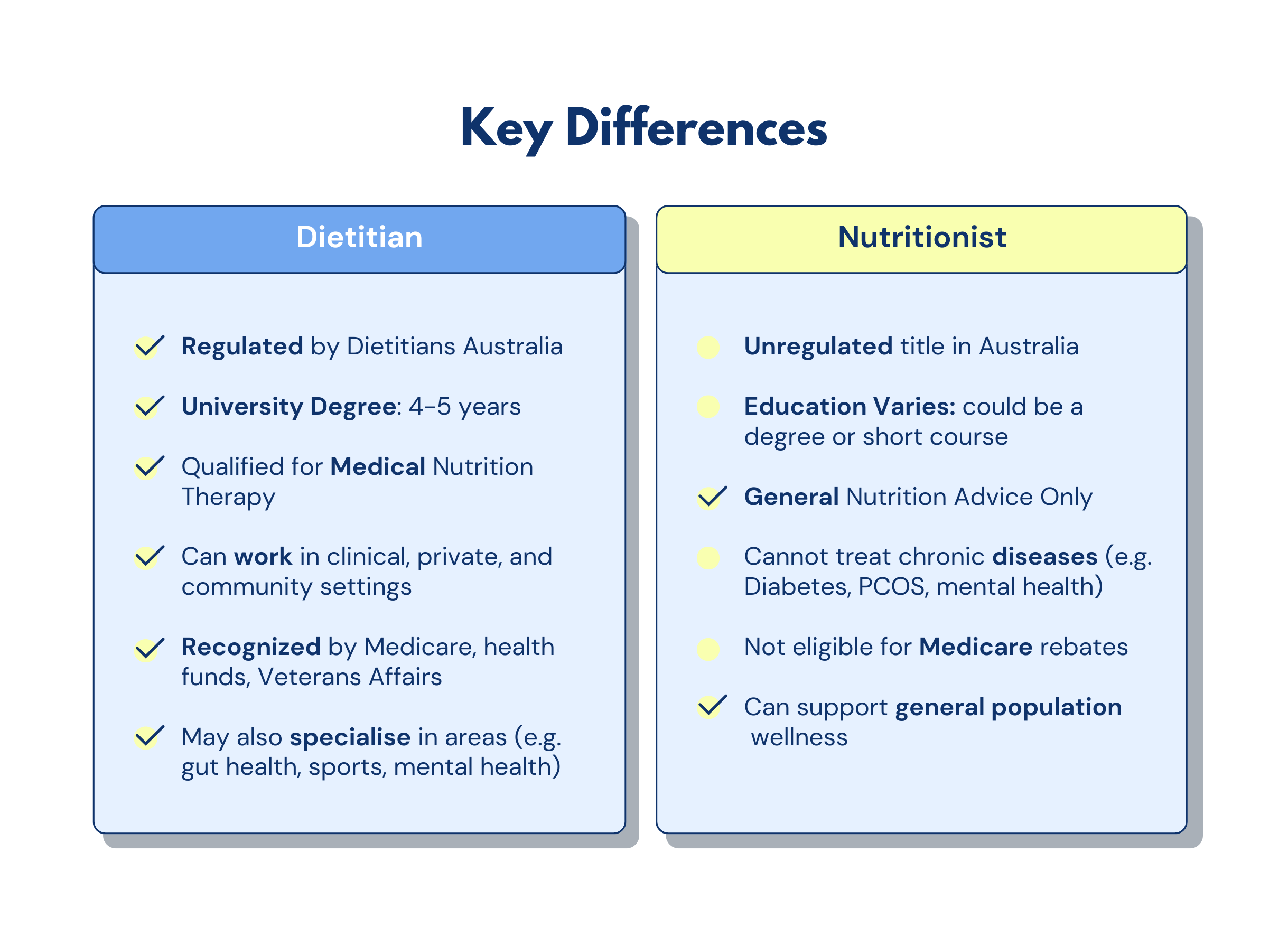Dietitian or Nutritionist – What’s the Difference?
Confused about the difference between a Dietitian and a Nutritionist in Australia? Let’s break down the key distinctions to help you make the right choice for your health.
Who Should You Trust for Dietary Advice?
With so many health professionals offering nutrition advice, it’s easy to feel overwhelmed about whom to trust. Though the terms Dietitian and Nutritionist may sound similar, the differences between them are significant. Knowing these distinctions helps ensure you get the appropriate care for your health needs.
Not All Nutritionists Are Dietitians
While all Dietitians are qualified as Nutritionists, not all Nutritionists are Dietitians. One key distinction is that the title Nutritionist is unregulated in Australia. This means that anyone - whether they’ve completed a full university degree or just taken a short online course - can call themselves a Nutritionist. Unfortunately, this creates confusion and makes it difficult to tell who has received proper, science-based education.
There are many highly trained Nutritionists with university degrees, and they provide valuable general nutrition advice. However, their training does not include medical nutrition therapy, meaning they are not qualified to treat chronic conditions like diabetes, insulin resistance, PCOS, or heart disease. Additionally, Nutritionists cannot work in clinical or community health settings.
What Makes Dietitians Different?
Dietitians hold a regulated title, governed by Dietitians Australia. To become a Dietitian, individuals must complete a 4-5 year University degree that includes advanced training in medical nutrition therapy. This allows Dietitians to treat chronic conditions, provide individualised care, and work across clinical, community, and private settings.
Dietitians not only develop tailored meal plans but also specialize in areas such as disordered eating, sports nutrition, and chronic disease management. Because of their scientific expertise, Dietitians are trusted to offer comprehensive care that addresses both prevention and treatment of illnesses.
What Are Accredited Practising Dietitians (APDs)?
Many Dietitians in Australia are also Accredited Practising Dietitians (APDs). This designation ensures they engage in ongoing professional development and meet strict industry standards. APDs adhere to the Dietitians Australia Code of Conduct and are recognized by private health insurers, Medicare, and Veterans Affairs, which can make rebates available for their services.
Who Should You See?
This isn’t to diminish the work of skilled Nutritionists - many provide excellent advice within their scope. However, it’s important to check the qualifications of anyone offering dietary support. A great question to ask is: Have they completed a university degree? If not, their advice may be well-meaning but lacks the depth of science-based training.
If you're unsure which professional is right for you, consider what type of support you need. For general advice, a Nutritionist might be a good fit. But for more individualised or clinical care, working with a Dietitian is essential.
To verify the credentials of a Dietitian, you can always check their status on the APD Register.
Work With Trusted Dietitians.
At Trusted Dietitians, we take the guesswork out of finding the right nutrition professional. Our experienced team of APDs is available to support clients across a range of needs - whether it’s through Employee Assistance Programs (EAP), private consultations, or corporate support. With our expertise, you can trust you’re in safe hands for all your health and nutrition needs.
Looking for the right advice? Get in touch today to explore how we can help you or your organisation.

